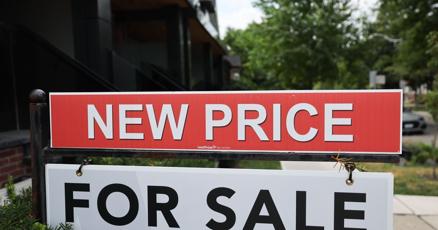Toronto's Real Estate Market: A Dive into Price Drops and Online Reactions
2 September 2025

Red Brick House Sells After Long Market Stint
So, there was this red brick house in Etobicoke that was chilling on the market for like 40 days this summer. Finally, after a few price chops, it got snagged for $1.545 million—way less than its last sale price during the Toronto real-estate craze back in spring 2002.
Buzzing Online: HouseSigmaBlunders Community
Everyone was buzzing about it online, especially in a Reddit group called HouseSigmaBlunders with nearly 5,000 members. It seems keeping tabs on property price drops has become some sort of twisted sport for them.
Surge in Homes Selling for Loss
Apparently, chucking mud from behind screens isn’t something new, but boy oh boy, observing these financial wipeouts, which can rack up to hundreds of thousands, certainly is. The share of homes selling for a loss in Toronto shot up from barely there at 0.7% in 2022 to a startling 7% this July, if HouseSigma's numbers are right.
Understanding the Fascination
But seriously, why are we so hooked on this stuff? Does it say something about us? Or the market?
Psychological Perspective on Housing Losses
Wilco van Dijk, a psychology prof, chalks it up to schadenfreude—that’s German for getting kicks out of others’ miseries. He explained from the Netherlands that it kind of makes us feel better about our own lives when folks around us hit a snag.
Conversation Across Platforms
And it’s not just Reddit where folks are gabbing about these downturns. The Toronto real estate subreddit is buzzing, as is a private Facebook group dubbed Toronto Housing Market Bubble. Oh, and on X (formerly Twitter), the blue check mark gang are also having a field day dishing out homes’ losses.
Twisted Form of Justice
Realistically, if a home was super pricey, people sometimes feel there’s an "undeserved advantage" to its high price tag. So, when the price tanks, it’s like some twisted form of justice, right? Van Dijk believes so, especially when mixed with a pinch of envy for not having a flashy $1 million pad ourselves.
Wealth Perception Shift
As house prices ballooned, "People got rich by just sitting there," and now that they're getting less rich, some folks think, 'maybe that's how it ought to be.'
Reassurance for Renters
Van Dijk himself rents in Amsterdam and reckons that seeing these losses sort of reassures renters about the choices they’ve made.
Thrill in Witnessing Financial Flubs
Michael Carney, from HouseSigma, agreed that there’s certainly a thrill in witnessing others’ financial flubs, especially among those who feel that the real estate speculation frenzy helped hike up prices in the past.
Interest from Potential Buyers
What’s more, there’s even big interest from potential buyers waiting for the right moment to jump into the market, and for homeowners, it’s about keeping tabs on their property's value, maybe even figuring out their next move if they find themselves stuck with a devalued home thanks to the market dip.
Online Forums as Therapeutic Spaces
Claire Tsai, a marketing professor, thinks these forums serve as a kind of therapy for those dealing with recent financial blues, helping them put things in perspective, maybe even finding some humor in the debacle.
Comparing Financial Losses
And hey, comparing your loss to someone else's bigger blunder? Might just make you feel a tad better about your own situation.
Transparency of Real Estate Changes
As for strategy talks, platforms like HouseSigma have made price changes public, so there's no hiding from the scrutiny. Like this one time, a Redditor pointed out a waterfront condo that sold for $30,000 less compared to 2017. Someone quipped, 'Poor guy bought a year too late. Timing is everything.'
Understanding the Bigger Picture
But Carney insists that these stories don't always paint the full picture. Sometimes, what seems like a loss might actually be part of a bigger win—like losing on a condo but scoring a forever home for less.
A Cultural Shift in Home Pricing
Paul Kershaw, a policy prof, views this whole phenomenon as something profound, maybe even hopeful. He thinks it reflects a cultural shift, a kind of awakening that maybe, just maybe, we're starting to see the real costs of our obsession with ever-rising home prices—a trend that's left countless behind, especially the younger gens.
The Need for Honest Conversations
These online gatherings, Kershaw believes, are a powerful echo of a larger conversation we need to have about what we really want from our home values. And perhaps, he muses, we might see home prices stabilizing, or even declining moderately soon.
Back to Blog
